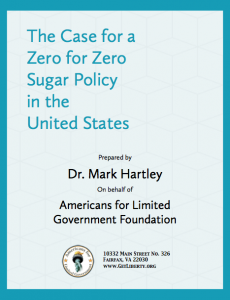
Federal government farm subsidies have long been a bane to free marketeers, and the anticipated passage of a new five year farm bill by the U.S. Congress will likely include another round of government price supports for commodities.
Congress’ balancing act is between the correct, but competing, desires to let the market set prices which benefits consumers, and to not allow foreign government price supports drive U.S. farmers out of the marketplace.
In a truly free agriculture market, there is a free flow of commodities between nations based upon supply and demand without any government skewing the markets. Unfortunately, governments all over the world have engaged in an escalation of protectionist policies for their own farmers, putting any nation that unilaterally disarms in the price support race at risk of losing their domestic production.
The Organization for Economic Cooperation and Development (OECD), an international body comprised of 34 countries to stimulate the global economy, recently flagged the run-up in global agricultural subsidies. An OECD report released last September said government support for agriculture in the world’s top farming nations increased in 2012, reversing a long-term downtrend amid signs the level of subsidies has continued to rise in 2013.
In Brazil, a major sugar producer, the World Trade Organization (WTO) reports that farm subsidies have doubled over the past three years, and that doesn’t even count the 20 percent jump this past year. In addition, the Brazilian government is in the process of bailing out their sugar ethanol program that has fallen on hard times contributing to the nation’s ability to dominate the world sugar market.
In Thailand, the government is manipulating the rice market, and a recent report by the OECD found that China has accelerated their farm support programs well above those found in the United States.
In a recent interview with “Farm Policy Facts” Darren Hudson, the director of the Cotton Economics Research Institute at Texas Tech University, said that if China “abandons its reserve policy in favor of paying its producers, that could result in significant price declines leaving U.S. (cotton) producers vulnerable to low prices for no other reason than China dumping its stocks.”
The bottom line is that U.S. farmers are at risk due to a worldwide farm support race.
Rather than accelerating farm subsidies in a never ending tit for tat with other nations, Congress has the opportunity to try a different approach to engage the world on agriculture supports. This third way focuses upon the always sticky issue of sugar price supports.
As explained in an Americans for Limited Government Foundation study by Dr. Mark Hartley of the College of Charleston’s School of Business, the proposal known as zero for zero “holds an as yet untried avenue that could possibly break the stalemate between the pro and anti sugar policy groups.”
Quite simply, the zero for zero approach would have Congress end U.S. sugar subsidies once the WTO succeeds in getting other nations to end theirs. This would give the U.S. government a first mover moral high ground when discussing ending worldwide sugar subsidies without the downside of putting the domestic sugar industry at a competitive disadvantage – effectively creating a win-win for all sides of the debate.
In a world where policy debates are dominated by interest groups taking intractable positions ensuring a death grip stalemate, the zero to zero policy is a good first step toward ending not only world-wide sugar subsidies, but can serve as a model on how to proceed with other commodities.
Sometimes all it takes is a little imagination and a willingness to look at a problem in a new way to break policy gridlocks. The zero for zero policy holds the promise of being just this kind of ground breaking solution.
Rick Manning (@rmanning957) is vice president of public policy and communications for Americans for Limited Government






